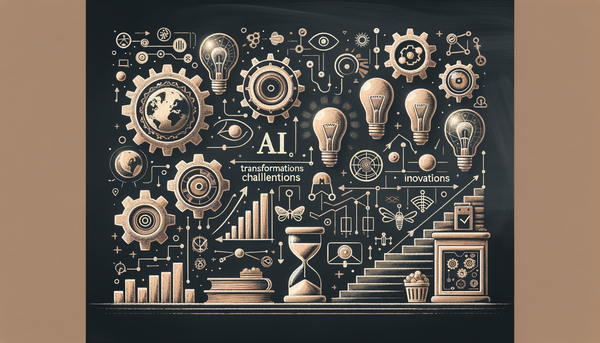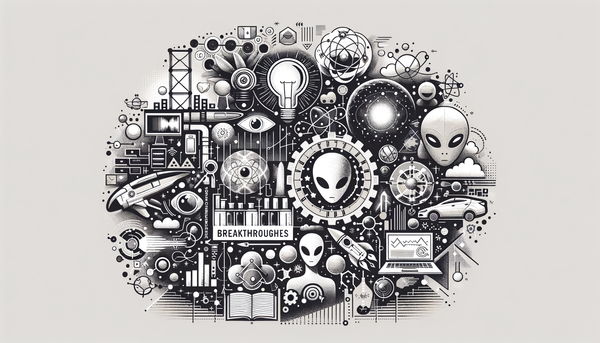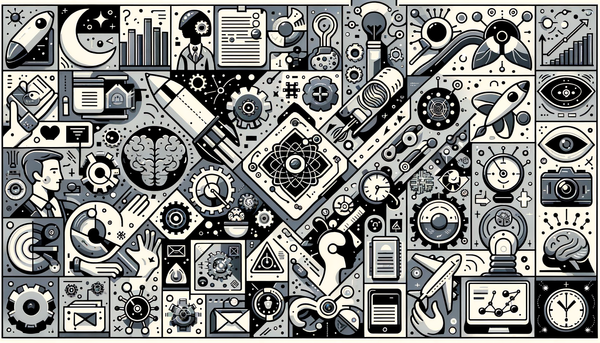AI News Update: Intel, SoftBank, and Meal Planning Innovations
AI in Flux: Leadership Shifts, Daily Innovations, Billion-Dollar Investments, and Global Tech Diplomacy
This article examines the rapidly evolving landscape of artificial intelligence by dissecting major recent events in the tech industry—from high-profile leadership transitions at Intel’s data centers and breakthrough consumer applications, to SoftBank’s audacious financing strategy for a massive AI push and the international political maneuvering around AI chip exports. We delve into the impact these developments have on industry strategies and daily life, integrating insights, research perspectives, and connections to additional discussions featured on AI.Biz.
Transformations at Intel: A Shift in Leadership Amid the AI Revolution
Recent organizational changes at Intel have captured the attention of industry watchers and tech enthusiasts alike. With the departure of Justin Hotard, the company's long-time Data Center boss who served for over 12 years, Intel is undergoing a significant transition in its leadership as it restructures its approach to AI chip development. As detailed by a report on CRN, Hotard's exit occurs amidst considerable shake-ups at the CEO level and within the AI chip divisions.
This transition, while marking the end of a successful era for Hotard, is emblematic of the enormous pressures companies face in balancing legacy operations with the demands of new technological frontiers. Intel has long been recognized for its innovations in semiconductor design and data center solutions; however, the increasing convergence of data processing power and artificial intelligence requires companies to be agile, forward-thinking, and willing to undertake structural changes.
In this context, leadership transitions are not merely about filling a vacancy—they represent a strategic pivot. The challenges that Intel now confronts include competing with emerging players who are investing heavily in specialized AI infrastructure, as well as meeting the growing global demand for smarter and more efficient systems. The industry is shifting from a focus on raw processing power to a nuanced blend of machine learning, edge computing, and energy-efficient chips. For further insights, consider reading our piece on safeguarding the American AI promise, which dives deeper into similar challenges faced by legacy tech giants.
"I imagine a world in which AI is going to make us work more productively, live longer, and have cleaner energy." – Fei-Fei Li
The developments at Intel are a microcosm of the broader industrial evolution. Research from multiple quarters indicates that restructuring leadership in technology companies often leads to renewed focus on R&D, improved operational efficiency, and an alignment of strategies with upcoming market realities. As Intel recalibrates its vision, industry analysts believe that the company will need to strike a delicate balance between innovation and stability—a challenge common to not just legacy chip manufacturers, but virtually every sector where technology rapidly advances.
Everyday AI: Changing the Way We Plan Meals and Shop for Groceries
While industry giants are adjusting their corporate strategies, another fascinating development is unfolding in the realm of consumer applications. AI is stepping beyond the confines of data centers and chip design to become a personal assistant in our everyday lives. A recent report by CBS12 highlights how artificial intelligence is now being harnessed to simplify meal planning and grocery shopping.
This innovation is not simply about automation; it reflects a broader trend towards personalized and efficient consumer experiences. The AI-powered system evaluates dietary restrictions, personal preferences, budget considerations, and even the freshness of ingredients. It then generates tailored meal plans and optimized grocery lists, drastically reducing the daily stress associated with meal preparation and shopping. By streamlining these mundane tasks, AI is freeing up our cognitive resources so that we can focus on more creative and strategic endeavors.
Imagine waking up on a busy weekday morning—rather than fretting over what to cook, you receive a personalized plan that factors in your health goals and pantry inventory. It’s the kind of technology that bridges the gap between convenience and nutritional awareness. For those interested in digital transformation across industries, our AI News updates on industry innovations provide further context on how AI is revolutionizing various sectors beyond the consumer market.
"Science Fiction, is the last great escape." – A.R. Merrydew
This consumer trend is underpinned by sophisticated machine learning algorithms and data analytics. Companies are increasingly mining user-generated data to refine these applications, ensuring that the suggestions continuously improve over time. In academic circles, studies are emerging that detail how personalized recommendation systems are no longer confined to entertainment but are making significant inroads into health, finance, and daily living. It’s a tangible example of artificial intelligence enhancing quality of life, similar to the initiatives seen in smart home systems and personal wellness technologies.
SoftBank’s Billion-Dollar Bet: Financing AI’s Next Frontier
On the financial front, a major shift is similarly underway. SoftBank, the Japanese conglomerate that has long been synonymous with bold investments in technology, is contemplating an unprecedented debt-heavy financing strategy to fuel a $500 billion push into artificial intelligence. As reported by Yahoo Finance, this strategy marks a departure from SoftBank’s traditionally conservative approach which primarily utilized internal funds and those of its investors.
The proposed financing could accelerate AI development across different sectors, potentially positioning SoftBank as a leader in the rapidly evolving AI ecosystem. SoftBank’s ambition reveals a recognition that artificial intelligence is not just another tech trend—it is a fundamental component of future economic growth and societal change. By leveraging significant capital, the firm aims to be at the forefront of the AI revolution, funding innovations that could range from improved machine learning algorithms to breakthrough robotics and IoT applications.
Such a bold financial maneuver is a double-edged sword. On the one hand, leveraging debt to fund research and development could yield high rewards if the technology pays off as predicted. On the other hand, it puts pressure on ensuring that every dollar is spent wisely amidst significant market volatility. Historical financial analyses indicate that while debt-heavy financing can spur rapid innovation, it also requires robust risk management frameworks to navigate unforeseen downturns.
For business leaders and tech investors, this move by SoftBank serves as a case study in the evolving dynamics of tech finance. It’s a reminder that innovation often rides on waves of substantial, sometimes risky financial bets. In another discussion on AI.Biz, our experts delve into the interplay between technological innovation and financing models in the piece exploring breakthroughs and challenges across the AI spectrum.
Notably, this massive funding generated by SoftBank also underscores a broader industry trend where companies are seeking to democratize tools that were once the exclusive domain of large enterprises or governments. The global race to adopt AI is now as much about strategic investment and management as it is about engineering breakthroughs. SoftBank’s endeavors could redefine the financial landscape of tech innovation, sparking collaborations, or even catalyzing even more aggressive moves by competitors seeking to avoid being left behind.
Geopolitics and Tech: Navigating AI Chip Export Waivers
In a demonstration of how artificial intelligence is at the epicenter of global diplomacy, recent news reveals that political leaders and governments are inserting themselves into the AI ecosystem. A report by Axios noted that Israeli Prime Minister Netanyahu has formally requested a waiver from the United States for the export of AI chips—a move designed to boost Israel’s technology industry and cement its status as an AI powerhouse.
The request comes at a time when the U.S. is tightening restrictions on technology exports, particularly to rivals like China. In this context, Netanyahu's appeal is not simply a bilateral negotiation; it is deeply embedded in the intense global competition for technological supremacy. The decision whether to grant the export waiver is poised to have far-reaching implications: it will affect everything from supply chains to international relations, potentially reshaping alliances and competitive strategies in the tech sector.
As we navigate these murky waters, it becomes essential to appreciate that artificial intelligence is not merely a commercial technology but a strategic asset with significant geopolitical weight. The case of AI chip export waivers is a complex matrix of national security, economic interests, and technological innovation. While some critics argue that loosening export restrictions could jeopardize strategic interests, others feel it is a necessary step to ensure that emerging markets, and indeed countries like Israel, can remain competitive in the global AI race.
This scenario draws parallels with historical periods of technological transition, where nations have had to balance protectionism against the need for open innovation. The debate is reminiscent of earlier discussions on nuclear proliferation and space exploration, where technological advancements necessitated unprecedented international dialogue. Our AI.Biz article on ethical considerations in AI innovations further explores how technology and geopolitics are inextricably linked in today’s digital age.
"As a technologist, I see how AI and the fourth industrial revolution will impact every aspect of people's lives." – Fei-Fei Li
In the coming years, the outcome of this waiver request will likely serve as a bellwether for similar international negotiations involving tech exports. It reminds us that technological innovation is seldom isolated—it carries with it significant diplomatic and economic ramifications that ripple far beyond corporate boardrooms and research labs.
Interconnecting the Threads of Innovation Across Industries
The four developments explored here illustrate that the field of artificial intelligence is not monolithic; it spans a multitude of sectors and scales, from high-stakes boardroom decisions to personal lifestyle enhancements. Whether it’s the seismic shift in leadership at Intel, which underscores the necessity of robust management in times of rapid technological advancement, or the everyday benefits provided by AI in streamlining meal planning and shopping, the narrative around AI is one of pervasive, all-encompassing change.
Each of these stories, though discrete, shares a common denominator: the need to adapt swiftly to an environment where data is the new currency and AI is the engine driving change. In the realm of corporate strategy, companies like SoftBank are prepared to shoulder enormous financial risks in pursuit of technological breakthroughs—with the stakes set high not just in terms of profits, but also in the future of global innovation.
From a socio-economic perspective, these shifts also point to a future where technological growth and everyday utility are seamlessly integrated. Consider the AI systems that help plan your meals; they are part of a broader wave of democratized technology that has the potential to make everyday life simpler, healthier, and more efficient. Meanwhile, on the geopolitical front, the balance between national security and competitive advantage in technology export policies is a balancing act with no easy answers.
Many leading researchers and industry experts today are stressing the importance of cross-disciplinary collaboration. Modern AI solutions require inputs from computer science, behavioral economics, data ethics, and even cultural studies. This interconnected approach can be observed in academic publications that explore neural networks for culinary recommendations as much as those that analyze the nuances of international tech financing. Events like the recent summits and forums covered in our ongoing series on AI.News Updates continue to provide healthy debates on these multidisciplinary challenges.
One particularly striking point of convergence is how the emerging AI applications for personal use are prompting broader conversations about privacy, bias, and ethical implications. As algorithms become increasingly embedded in our daily routines—from suggesting recipes to determining which technology investments are viable—the onus is on both developers and regulators to ensure that these systems are transparent, equitable, and aligned with societal values.
Learning from the Past and Paving the Path Forward
The current landscape of artificial intelligence invites us to reflect on the lessons of history while also contemplating the road ahead. The departure of seasoned executives, such as Justin Hotard at Intel, signals more than just an ending—it marks the necessity for companies to innovate and restructure in response to external pressures. In many ways, it mirrors past transitions seen in industries when digital disruption changed the rules of the game. Just as the advent of the personal computer revolutionized information technology in the late 20th century, the AI era promises transformations that could reshape every aspect of our economy and society.
Similarly, looking at consumer-based innovations like AI-assisted meal planning provides a glimpse into the future where technology integrates seamlessly into our lifestyles. The blending of advanced analytics with everyday tasks speaks volumes about the incredible potential of AI to improve quality of life, reduce waste, and empower individuals to make informed decisions. Anecdotes of busy parents or health-conscious individuals leveraging these systems to create surefire, nutritious meal plans are fast becoming commonplace, further humanizing the technology that many once considered impersonal.
This convergence of corporate strategy, consumer application, and international tech diplomacy underscores an ecosystem that is both complex and delicately balanced. It compels stakeholders across all spectra—from financiers and policymakers to everyday users—to engage with the opportunities and challenges head-on. The journey toward harnessing AI’s true potential will require us to embrace change, foster innovation, and most importantly, ensure that technology serves as an enabler of progress rather than a harbinger of disruption.
By monitoring these developments closely, we can better predict and influence the trajectory of AI technology globally. It is in these dynamic intersections that groundbreaking innovations are born, and it is up to us—as policymakers, business leaders, researchers, and citizens—to craft an environment where technological advancement can flourish responsibly and sustainably.
Final Thoughts: The Era of AI is Here and Ever-Evolving
In synthesis, the current mosaic of AI developments—from executive shake-ups at major corporations like Intel and innovative consumer applications, to audacious financial strategies exemplified by SoftBank, and tense discussions over international tech export policies—illustrates an industry that is perpetually in flux. Every single component, whether in the form of leadership transitions or practical everyday innovations, contributes to the unfolding narrative of a world where AI is not merely a technological tool, but a transformational force.
This transformation is not without challenges. Each leap forward, as history has repeatedly shown, carries risks and necessitates thoughtful management. However, as echoed in our analysis and supported by ongoing discussions in AI.Biz’s range of articles—such as our overviews on DeepMind breakthroughs and AI challenges and the ethical dimensions in innovations and leadership—there is a shared conviction among industry experts that the future is bright, provided we navigate this landscape with a blend of caution, creativity, and ethical responsibility.
Reflecting on the journey that brought us here, the words of Fei-Fei Li serve as both inspiration and a pragmatic reminder: the promise of AI is not just about efficiency or economic gains but also about enhancing the human experience. As we stand on the cusp of what may be one of the most transformative periods in our technological evolution, the stories of leadership renewal, user-centric innovations, and strategic global partnerships remind us that the future belongs to those who are willing to innovate, adapt, and lead with integrity.
Whether it’s redefining corporate structures, streamlining everyday tasks, or forging new paths in the global tech arena, the era of AI is here to stay—dynamic, challenging, and immensely promising. And as we continue to witness these developments, one thing remains clear: the AI revolution is not a temporary trend but a permanent shift that will redefine industries, economies, and our day-to-day lives for generations to come.
Further Readings
- Safeguarding American AI: Intel's Promise and the Potential of Qualcomm's New Chip
- AI News Updates: Summits, Innovations, Challenges
- AI News Podcast: DeepMind Breakthrough, AI in the Music Industry, and More
- AI News Update: Innovations, Leaders, Ethical Considerations
- CRN: Analysis - Intel Data Center Boss Justin Hotard Leaves After CEO, AI Chip Shake-Ups
- CBS12: Using A.I. to Plan Your Meals and Grocery Trips
- Yahoo Finance: SoftBank Explores Debt-Heavy Financing for $500 Billion AI Push
- Axios: Netanyahu Asked U.S. for AI Chip Export Waiver




